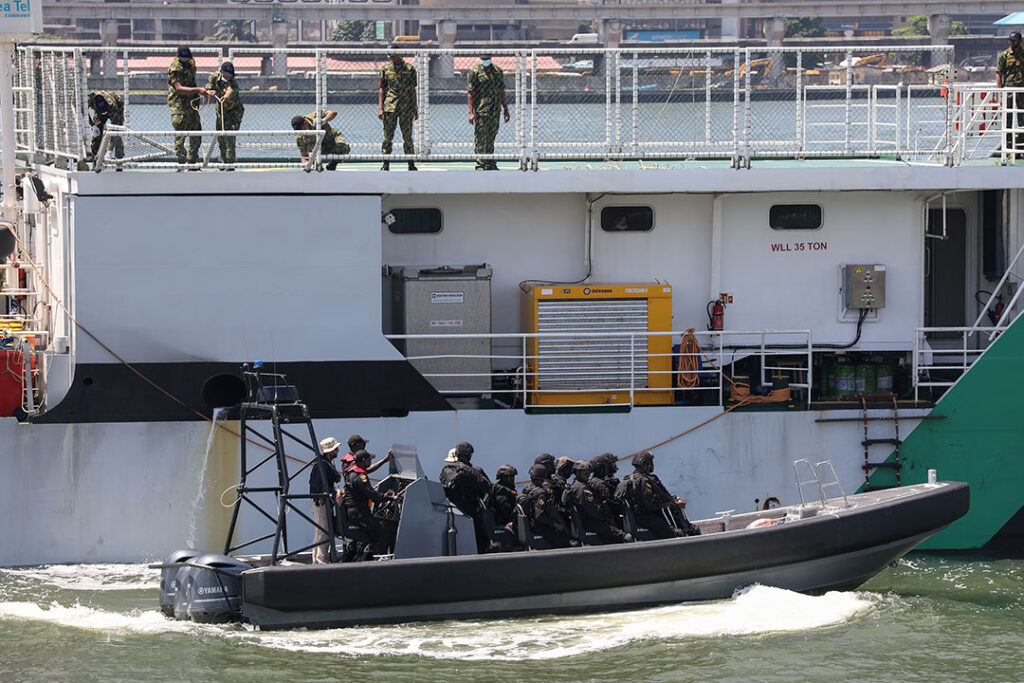Seven armed pirates attacked and boarded a cargo ship sailing from Cameroon to the Democratic Republic of Congo on May 29. While most of the crew locked themselves in the citadel, one crew member was injured and abducted by the hijackers during the attack. It is not clear whether the kidnap victim was released.
The hijacking between Nigeria and São Tomé and Príncipe was one of 12 piracy incidents reported in the Gulf of Guinea region in the first half of this year. There were 18 such incidents last year. The uptick coincides with an increase of kidnappings for ransom at sea. Effective counterpiracy measures in the Bight of Biafra, which stretches from the Niger River in Nigeria to Cape Lopez in Gabon, forced pirates to change tactics. Pirates typically strike in coastal areas with high unemployment rates, often in mangrove regions or on land.
“Indeed, a confluence of factors make piracy and armed robbery at sea a perpetual threat to the Gulf of Guinea region,” analyst Maisie Pigeon wrote for the Atlantic Council. “Among them are competing security priorities that divert attention and resources away from maritime threats, leaving vast coastal areas vulnerable.”
In Benin, Côte d’Ivoire, Ghana, Togo and Nigeria, this includes persistent, increasing terror threats from the north.
Pirates are known to abduct government officials and crew members on ships. In October 2024, armed Nigerian pirates kidnapped Ewane Roland Ekeh, then divisional officer of Idabato, Cameroon, a border town in the Bakassi Peninsula, and Etongo Ismael, a council worker in Idabato.. The victims were reportedly tortured and a video of Ewane pleading for help went viral on social media. Ekeh was released March 17 after the kidnappers demanded a $700,000 ransom. Ismael was released July 15.
Several other piracy-related kidnappings for ransom have been recorded in the Gulf of Guinea this year. On March 17, armed attackers abducted 10 crew members from a Panama-flagged tanker about 40 nautical miles southeast of Príncipe. The pirates also stole mobile phones, gold items and a laptop.
Pirates abducted seven crew members from three Ghana-flagged fishing vessels 10 days later, about 16 nautical miles off the coast of Accra, Ghana. Lydia Yaako Donko, director-general of Ghana’s Criminal Investigations Department, said in a safety4sea.com report that the victims were taken to the Niger Delta, held in a remote camp and abandoned on April 25. Officials arrested four people, including the vessel’s bosun, cook and second engineer, in conjunction with the crime.
According to the United Nations Office on Drugs and Crime, there are Nigerian pirate camps in border areas near Cameroon. Col. Ndikum Azieh, Cameroon’s Delta Rapid Intervention Battalion commander, has said there are nine active Nigerian pirate groups operating in the Bakassi Peninsula. According to the Institute for Security Studies, one group of nearly 270 fighters is led by a “Border King” and is organized into nine units overseen by a “general.”
The groups are known to operate “well beyond their home bases, extending their reach to far-off waters, including those of Equatorial Guinea, São Tomé and Príncipe, and Gabon,” Raoul Sumo Tayo, senior researcher at Enhancing Africa’s Ability to Counter Transnational Crime, wrote for the institute.
When targeting government officials and other high-value targets, the pirates gather intelligence and strike at night with swift boats and teams of about 10 pirates armed with AK-47s or PKM 7.62 machine guns. These operations are usually completed within five minutes, according to Tayo, who reported that pirates collected about $400,000 in ransom in Nigeria between July 2022 and June 2023.
The profits are split between “kingpins, sponsors, group leaders, negotiators, specialized team members, assault teams, camp guards, and those providing onshore support,” Tayo wrote.
Writing for the Atlantic Council, analyst Pigeon offered several recommendations for authorities to address the issue:
–– Continue and improve regional collaboration and information sharing related to maritime security.
–– Target high-level pirate actors, including investors and facilitators, as they enable and profit from maritime crime but are often insulated from direct risk.
–– Support viable economic alternatives to address the underlying socioeconomic conditions that drive maritime crimes.
–– Garner continued support from the European Union and other international partners.

